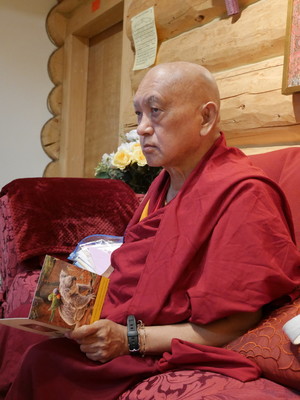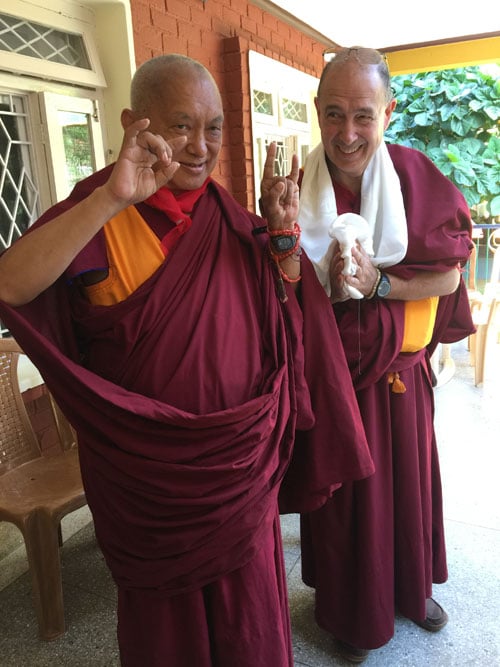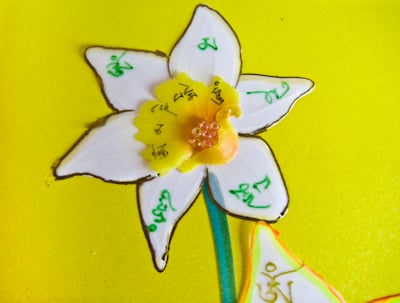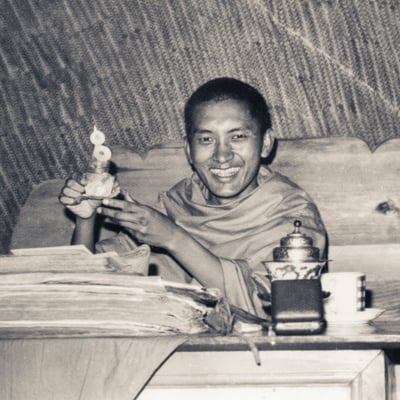Here I wanted to pass this on for you to please think about:
By thinking about the suffering of hell beings, pretas [hungry ghosts] and animals, if you compare your friend’s suffering with that, it is still like great peace and happiness.
In early years she told me, in a kind of shocked way, that in this life she thinks it would not have been possible that she created the karma for this to happen, and she asked what wrong karma she did in this life for this to happen. She didn’t feel she had done anything that bad.
It’s so important to understand that this suffering came from karma. It did not just happen from its own side; it happened due to a cause. She must have created the cause—the karma— from her own side, but she thought that she hadn’t created such bad karma.
Many Dharma students, even non-Dharma people, may also think like this, because they do not understand karma. Even karma created in this life, depending on how heavy it is, can cause this. It depends on how heavy it is.
You also have to relate to past lives and the past karma from beginningless rebirths. If you don’t think in this way, then it becomes strange. It seems like the suffering and the karma is independent, that it is not created by the mind; that it does not come from the mind.
In reality we could have created much worse karma, even in this life, but now we have to think about the karma collected from beginningless rebirths—all kinds, all kinds, all kinds. However, we don’t know, we don’t have omniscience, we don’t even have clairvoyance, even knowing just one past or future life.
Using my own experience, I sometimes have my mala around my neck, and then I look for the mala outside but I cannot find it. There is no mala. This has happened to me a few times. There could be other funny examples, but I will try to not waste time remembering them.
In Tibet there is one story about counting animals. You are riding an animal and you have a certain number of animals that you have to keep count of. You never count the animal you are riding—you only count the other animals—so there is always one animal missing.
According to the fourth verse of the Eight Verses of Thought Transformation:
Whenever I see beings who are wicked in nature
And overwhelmed by violent negative actions and suffering,
I shall hold such rare ones dear,
As if I had found a precious treasure.
This verse is [about how to view those sentient beings] whose nature is so wicked, unbelievably heretical, self-cherishing, incredible egocentric, totally not caring for others, only for themselves, among the numberless sentient beings. Then there is the heavy negative karma created, such as the five heavy negative karmas without break—killing one’s father, mother or an arhat, causing disunity among the Sangha, and drawing blood from a buddha—also, criticizing bodhisattvas or holy beings, or even giving up the guru, breaking one’s samaya and so forth. The result is unbearable suffering.
For example, this student has experienced unbearable pain and suffering for so many years. She has been tormented for so many years, can you imagine? Not just for one year, one month, one week, one hour—not like that. What she is experiencing is unbearable, with so much suffering. She is suffering like this in so many ways.
In her case she has unbelievable pain and there is so much heavy suffering, therefore she has no opportunity to listen, reflect and meditate. The incredible opportunity is not there; she can’t listen, reflect and meditate. This incredible opportunity is blocked. She can’t do anything because of the suffering and as you know, having received this precious human rebirth just one time, there is the capacity to do this, but right now she can’t do this.
Thinking in this way helps us develop stronger compassion. It also helps us develop stronger renunciation, by thinking of the shortcomings of samsara—how samsara is in the nature of suffering. Then because of that we are able to quickly develop stronger compassion, we can quickly develop stronger bodhicitta. That is the cause of being able to achieve enlightenment quicker.
That’s why this person is not only like a wish-granting jewel, she is more than a wish-granting jewel, and not just one wish-granting jewel, but numberless wish-granting jewels, the whole sky filled with wish-granting jewels. She is more precious than that. For you, she is so precious.
It is not easy to [think like this] with everyone, and that’s why this verse says these people are rare, so difficult to find. So think like that. That’s why the verse says: “I shall hold such rare ones dear, as if I had found a precious treasure.”
Here, you can see, being able to find this person, there is no comparison with finding a wish-granting jewel or even the whole sky filled with them. This person is unbelievably precious, much more than [skies of wish-granting jewels].
By cherishing her, for example, you can become free from the lower realms. By cherishing her, you become free from samsara. By cherishing her, you become free from the lower nirvana. By cherishing her, it is the cause for you to achieve enlightenment for numberless sentient beings, in order to free them from the oceans of samsara sufferings and bring them into the peerless happiness—the total cessation of even the subtle obscurations and completion of realizations.
Even if you have not only one wish-granting jewel, but limitless skies of wish-granting jewels, she is more precious than that; even though when you pray to them you can get whatever you need—all the comforts, all the material things, all the needs of this life. However, from a wish-granting jewel you cannot be liberated from the lower realms; you can’t be free samsara, just from that; you can’t be free from lower nirvana, just from that. You can’t achieve the peerless happiness—the total cessation of obscurations and completion of realizations—and you can’t free every sentient being from the oceans of samsara sufferings and bring them to full enlightenment.
This is the practice based on the fourth verse of the Eight Verses of Thought Transformation. It is so important, like having found wish-granting jewel at your own home, without the need to look for it outside.
So my idea is that people should go to help her with this bodhicitta, with this compassionate thought, with this understanding. If people go to help her for even five minutes, half an hour or one hour, it would be so good in order to develop their mind—for their purification and to collect extensive merits with a bodhicitta motivation.
Just to clarify, here I am explaining the commentary of the fourth verse from the Eight Verses of Thought Transformation. It does not mean that her mind is wicked in nature and so forth.
Her suffering—the unbearable pain and many problems she has been experiencing for so many years—is the result of very heavy karma. This is how to relate to her actual situation. It can help to understand why samsara is in the nature of suffering for us.
By mentioning the need to offer service to her, that is to especially generate strong compassion, which enables us to achieve enlightenment quickly. Therefore, it is most unbelievably worthwhile to help her, to serve her, even for one day, half a day, one hour, fifteen minutes or even five minutes.
Serve her gently and sweetly, as pleasantly as possible. Of course, there can be certain things that harm patients and it’s very important to be wise and help them not to do certain things, and to be gentle, not violent and scolding. It can be the case in old age homes and hospitals that some caregivers go there thinking it is just a job, and they don’t do the work with compassion, but do it more for money, for their job. They don’t have respect for the old people and sick people; instead they do it just like a job and then they leave to go home. It is very important to serve from the heart, then it makes a big difference for the elderly and sick people. They feel much happiness.
So if this person accepts and needs help, then it is very good to serve her, and if you can, do it in the way she wants.
We can never tell how it would be if it happened to us. We think that we will never experience this, but in reality, we can never tell—we can’t see what will happen in the future, even tomorrow, even tonight. When we do experience this, we will need an unbelievable amount of help from others. We will become totally dependent on others helping us.
By serving her, an unbelievable amount of negative karma collected from beginningless rebirths is purified and you also collect extensive merits—especially if it is done with bodhicitta, then you collect more than skies of merits.
Even if you don’t care about the benefits that you receive, you still need to serve, as the other person needs your help.
I will just tell my own story because I have the dry name “Rinpoche.” When I was with Lama Yeshe, who had served me for many years, the last time when Lama was going to Los Angeles from Santa Cruz by a small airplane—in the plane there was Mummy Max and maybe Thubten Monlam, and myself, and during the flight I cleaned Lama’s kaka two times. That made Lama very happy. Lama was so happy, and it seemed like Lama Yeshe did that just for me, to purify me and so that I could collect extensive merits, to bring me closer to enlightenment. Of course, this was serving Buddha.
Many students know the story of Asanga, who spent twelve years in retreat trying to achieve [realizations of] Maitreya Buddha. But that happened only after having given up the retreat, when he saw a wounded dog. The lower part of the dog’s body was wounded and full of maggots. Asanga felt unbearable compassion, so he cut a piece of flesh from his thigh and picked up the maggots with his tongue, so as not to harm them. Then he put the maggots on the flesh that he had cut off. As he was picking up the maggots with the tip of his tongue, he couldn’t feel them, so he opened his eyes and instead of seeing the wounded dog he saw Maitreya Buddha.
What happened was that he generated unbelievable compassion by cutting his thigh and picking up the maggots with his tongue, so as not to harm them. By doing that he purified all the defilements that had prevented him from seeing Maitreya Buddha. Now the wounded dog was not there and he was able to see Maitreya Buddha. After that he received teachings on the five sections of Maitreya Buddha’s teachings in Tushita pure land, where one morning is equal to fifty human years.
After that he came down and wrote the five commentaries, [The Five Treatises of Maitreya, Tib: byams chos sde lnga]. From that, numberless beings, by listening, reflecting and meditating on these texts, have completed the path and achieved enlightenment, and if not enlightened then they have achieved the path. Even now in the monasteries and universities these philosophical teachings have been studied from then up to now. This has benefited numberless beings to become free from samsara, all the six-realm sentient beings. It is unbelievable, unbelievable, unbelievable!
Shakyamuni Buddha practiced charity by giving away his eyes, limbs, body, to the sentient beings for three countless great eons. He also practiced morality, patience, perseverance, concentration and wisdom for three countless great eons. Then he completed the two types of merits: the merit of wisdom and merit of virtue, and achieved the rupakaya and dharmakaya.
Now we are so fortunate to be able to study the teachings of the Buddha, what the Buddha has taught, from this complete experience. Then especially Lama Atisha wrote the Lamp for the Path to Enlightenment, which simplified all the Buddha’s teachings and is where the lamrim started.
Especially now, how unbelievably, inexpressibly fortunate we are. All of this is from the kindness of the Buddha, who totally dedicated his life to sentient beings, who served sentient beings, even during the time when he was a bodhisattva.
The conclusion is that all this came from the kindness of sentient beings.
Another story is in the commentary of Vajrayogini. Getsul Tsimbulwa was the disciple of a great yogi called Ngagpa Chöpawa. Getsul Tsimbulwa was a monk living in thirty-six vows. First his teacher came, because he was going for his last conduct (tantric conduct) in Oddiyana, which I think is near West Bengal. There was a big river and at the river’s edge there was a totally poor lady, full of leprosy disease. Pus and blood were coming out of her and she was very dirty. She asked, “Please take me to the other side of the river.” The great yogi Ngagpa Chöpawa did not listen and he went straight across the river without helping her.
Then his disciple Getsul Tsimbulwa came along and she asked him the same thing. As soon as he saw her, unbelievable compassion arose. He did not care at all that by touching her he might also get leprosy, and also that she was a woman, therefore as a monk he could not touch her. So he immediately carried her across the river on his back. When he was only halfway across the river, because of the compassion he had generated, he purified so much negative karma and obscurations. Then the lady was no longer that dirty ordinary lady, but actually Dorje Phagmo, who is the same as Varayogini. She was Dorje Phagmo from the beginning but he could not see that before. Now he saw her as Dorje Phagmo and then without the need to leave his body, she took him to Dagpa Khachö, Vajrayogini’s pure land. Once you are there it means that you can definitely become enlightened. This is one of the pure lands where you can become enlightened.
So this came from the unbelievable, unbelievable compassion which arose. Therefore, we must totally dedicate our whole life to serving others. In this story Getsul Tsimbulwa carried the lady on his back and from this he totally purified his negative karma which projected the totally terrible, dirty, diseased lady, full of leprosy, pus and blood and so forth. Then he saw the deity. She was the deity before, but now he actually saw the deity.
This means that due to strong compassion you can achieve enlightenment, and not only that, it brings you to enlightenment quickly. You dedicate your life to serving other sentient beings, and they bring you to enlightenment quickly. So that’s the conclusion. There are numberless stories that explain this.
When you serve this person, by knowing the benefits, by realizing and keeping this in your mind, you can serve her as the most precious, kindest, dearest, wish-fulfilling jewel. It is from her that you receive all the happiness, from beginningless rebirths, from the present time and up to enlightenment. You receive all the three times’ happiness from her.
By taking refuge in the numberless Buddhas, Dharma and Sangha you will become free from the lower realms, free from samsara, free from lower nirvana and you will achieve the peerless happiness, free from all the obscurations and having completed all the realizations. Then you are able to free the numberless sentient beings from the oceans of samsara suffering and bring them to buddhahood.
All the numberless buddhas, Dharma and Sangha—relating here to this person—come from her. When you serve her, think how precious she is. Serve her with this in your mind. Then your work doesn’t become just like a job; it becomes the most important Dharma practice in order to quickly to achieve enlightenment for sentient beings.
Thank you very much.
With much love and prayers ...


































